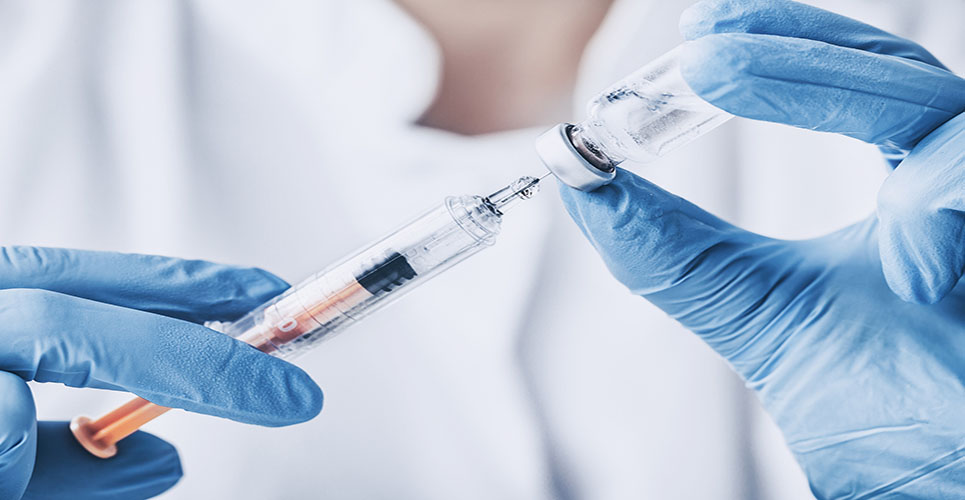A new vaccine aimed at enabling the immune system to fight against advanced cancer is being trialled in London and Guildford.
Scientists are testing the effectiveness and safety of the vaccine, which works by resembling the natural immune responses generated by the body against bacterial and viral infections.
All patients with any solid tumour, irrespective of their type of cancer and tumour genetic profile, are believed to have the potential to benefit from this sort of treatment.
The VAPER trial is taking place at the National Institute for Health Research (NIHR) Guy’s and St Thomas’ Clinical Research Facility and the NIHR Guy’s and St Thomas’ Biomedical Research Centre (BRC). Other centres at the Surrey Cancer Research Institute (SCRI) at the University of Surrey and the Royal Surrey County Hospital are expected to commence patient recruitment later this year.
The first two patients have already been vaccinated in a trial that is anticipated to run for 18–24 months with recruitment of patients currently ongoing.
The aim of the trial is to establish the benefits of the vaccination programme, any side effects associated with it and the impact of this treatment on patients’ quality of life. Scientists hope the results will take them one step closer to developing an effective but nontoxic cancer therapy that can be used in clinical practice.
The clinical teams are being led by Dr James Spicer, Principal Investigator at Guy’s and St Thomas’ Biomedical Research Centre and Professor Hardev Pandha from SCRI.
Dr Spicer said: “The unique feature of this study is the use of additional agents to boost the vaccination response. It is hoped this will abolish the inhibitory effect of regulatory immune cells present in the patients’ circulation, which are believed to have limited the effectiveness of previous cancer vaccine approaches.”
Professor Pandha said, “We know that the immune system in patients with advanced cancer is supressed, so it’s unable to recognise and kill cancer cells. In this trial we are investigating a form of immunotherapy designed to activate the body’s immune system by administration of a vaccine based on fragments of a key cancer protein.”
The design of the VAPER trial is a natural progression and development of the results obtained from previous pilot immunotherapy studies and is supported by data from related trials carried out in the UK, USA and elsewhere in Europe.
Candles, a Lincolnshire Registered Charity, has played a crucial role in supporting the research including the key pioneering work carried out by Professor Eremin at the Lincoln County Hospital and Queen’s Medical Centre, Nottingham and by Professor Farzin Farzaneh, King’s College London. Candles continues to provide funding for this new VAPER trial programme and to actively fundraise for the continuation of the research.
Should the trial prove successful showing the vaccine is well tolerated, it will be expanded to a larger number of patients to further assess its effectiveness.
Life Sciences Minister George Freeman MP said: “This trial is pushing new boundaries for potential cancer treatments, and brings new hope for patients in the fight against cancer. The prospect of a vaccine to help the body’s immune system fight advanced cancer highlights the ground-breaking work being delivered by our world-leading life sciences sector, supported through the Government’s continued investment in the National Institute for Health Research.”
Patient case study – Miss Kelly Potter
Beckenham resident Kelly Potter, 35, a patient of Guy’s Hospital is on the VAPER trial. She was diagnosed with stage four cervical cancer in July 2015. She said: “Although I had excellent treatment at Guy’s Hospital where the cancer was stabilised, it had already spread to spots on my liver and lungs. So when I was told that I may be eligible for this trial, I was delighted.
“When I read the leaflet about the VAPER trial it struck me that it seemed a bit of breakthrough and that if it worked, it could be a revolution in the treatment of cancer.
“To be part of the trial has changed my life for the better. It’s been a very positive experience and really interesting. I feel honoured to be involved. You get the best treatment anyway at Guy’s but it’s fantastic to be part of something that could be ground breaking.
“I had my first injection on Tuesday 9 February and have another seven visits to complete the treatment. They did say there may be flu like symptoms but I haven’t noticed anything yet.
“The way I have been cared for and treated by the clinical trial staff is exceptional. Everyone says hello, they know my name, they are very caring, you are not just a person or a number they treat you individually. I can’t thank them enough.
“My hope for the future is to beat the cancer for as long as I can and if I can’t I have come to terms with that. I would like to go on and inspire others with cancer. I am already supporting cancer patients on social media, telling them what to expect by sharing my own experiences but ultimately, I would love to volunteer or work for a cancer charity.”

